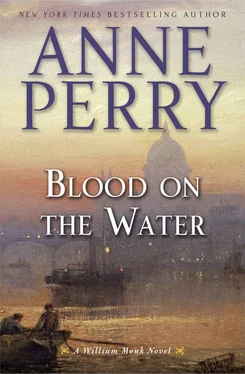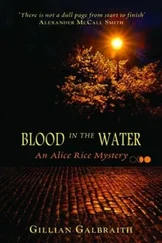Anne Perry - Blood on the Water
Здесь есть возможность читать онлайн «Anne Perry - Blood on the Water» весь текст электронной книги совершенно бесплатно (целиком полную версию без сокращений). В некоторых случаях можно слушать аудио, скачать через торрент в формате fb2 и присутствует краткое содержание. Год выпуска: 2014, ISBN: 2014, Издательство: Random House Publishing Group, Жанр: Исторический детектив, на английском языке. Описание произведения, (предисловие) а так же отзывы посетителей доступны на портале библиотеки ЛибКат.
- Название:Blood on the Water
- Автор:
- Издательство:Random House Publishing Group
- Жанр:
- Год:2014
- ISBN:978-0-345-54844-3
- Рейтинг книги:3 / 5. Голосов: 1
-
Избранное:Добавить в избранное
- Отзывы:
-
Ваша оценка:
- 60
- 1
- 2
- 3
- 4
- 5
Blood on the Water: краткое содержание, описание и аннотация
Предлагаем к чтению аннотацию, описание, краткое содержание или предисловие (зависит от того, что написал сам автор книги «Blood on the Water»). Если вы не нашли необходимую информацию о книге — напишите в комментариях, мы постараемся отыскать её.
Blood on the Water — читать онлайн бесплатно полную книгу (весь текст) целиком
Ниже представлен текст книги, разбитый по страницам. Система сохранения места последней прочитанной страницы, позволяет с удобством читать онлайн бесплатно книгу «Blood on the Water», без необходимости каждый раз заново искать на чём Вы остановились. Поставьте закладку, и сможете в любой момент перейти на страницу, на которой закончили чтение.
Интервал:
Закладка:
“Yes, my lord. Thank you.” Brancaster relaxed visibly, relief flooding up his face.
Pryor returned to his seat with an ill grace, biding his time.
There was a buzz of excitement as Brancaster called Major Richard Kittering. The doors opened and Kittering, lean, gaunt, walking slowly and with the aid of crutches, made his way to the witness stand.
Antrobus leaned forward. “Major Kittering, would you prefer to give your evidence from the floor, sir? There is no need for you to climb up to the witness stand. The steps are somewhat awkward. If you care to sit, a chair can be brought.”
“Thank you, my lord,” Kittering replied. “I shall stand as long as I am able.”
Antrobus nodded. “Mr. Brancaster, perhaps you will keep your examination as brief as you may, and still serve your purpose.”
“My lord.”
Kittering was sworn in and Brancaster came into the body of the floor, speaking respectfully as to a man who had earned the right to it. He established Kittering’s military record and the regiment in which he had served, that he had been wounded in Egypt and had returned to England earlier in the year.
“Are you acquainted with the accused, Gamal Sabri?” Brancaster asked.
“No, sir, not personally.”
“His family?” Brancaster enquired.
Kittering’s face was stiff, as if he were controlling his inner pain only with difficulty. “No, sir, only by repute.”
“Repute?”
There was not a sound in the courtroom except for a woman coughing and instantly stifling it.
“Yes, sir. My friend Captain John Stanley knew Sabri’s family …” Kittering’s voice faltered and he struggled to maintain his composure. His emotion was palpable in the room.
“You use the past tense, Major Kittering,” Brancaster said gently. “He does not know them anymore?”
Kittering lifted his chin and swallowed hard. “I regret to say that all Mr. Sabri’s family perished in the massacre at Shaluf et Terrabeh.”
“All of them?” Brancaster said incredulously.
“Yes, sir. There were two hundred people who died that night. Every man, woman, and child in the village.” His voice broke and his face was ashen.
Brancaster’s question was little more than a whisper, but the room was motionless; every word was audible.
“You used the word ‘massacre.’ Do I take it that they were murdered … two hundred of them?”
Kittering, standing ramrod stiff, swayed a little.
“Yes, sir. By marauding mercenaries who mistook where they were.”
Brancaster moved forward a step, as if he were afraid Kittering might fall.
“Were you there, Major?”
“No, sir, I was not. I heard of it from Captain Stanley.”
“He was there?”
“Yes, sir. He tried to prevent it, but the officer in command wouldn’t listen. Mercenaries, all nationalities …” His voice tailed off. His skin was ashen. “But the man in charge was British …”
“Captain Stanley told you this?”
“Yes, sir. The man in charge was arrogant, brave, a good soldier spoiled by a filthy temper.”
Kittering looked so fragile Brancaster began a sentence and changed his mind, afraid to draw the questioning out any further than he had to. “Stanley was there, and saw it all?”
“Yes, sir, almost all. In trying to stop the massacre, he was knocked senseless. That may have saved his life.”
“Then why are you here testifying, and not Stanley?” Brancaster asked, moving another step forward.
“He was injured and had only just returned to England, sir. He went down on the Princess Mary .”
There were sighs around the room. A woman sobbed.
On the bench Antrobus leaned forward and ordered the usher to fetch a chair for Kittering. Brancaster helped him onto it, propping the crutches beside him where he could reach them.
“Thank you, Major Kittering,” Brancaster said gravely. “We mourn the loss of Captain Stanley, and all the other nearly two hundred men and women who drowned in the Thames that night. We also mourn those innocent people who lost their lives in Egypt, due to the arrogance and ill-temper of a British renegade officer who would not be counseled.” He turned to Pryor. “Your witness, sir.”
Pryor stood up. Perhaps he was at last aware that the entire room was against him. They were numb with horror at the tragedy, and the mindless evil of it all. They looked at Kittering, his pain and his shame for his brother officers written indelibly in his face. They waited for Pryor to attack him.
Pryor was too wise and, Rathbone thought, also too self-serving, to make such an error.
“I will not keep you long, Major Kittering. I regret having to trouble you at all.”
Kittering nodded.
“When and where did Captain Stanley tell you about this appalling event?”
“When he came to see me, on returning home,” Kittering answered. “It was at the beginning of May. Two days before the sailing of the Princess Mary .”
“And you believed his account, word for word?” Pryor did not invest his voice with doubt; he knew better than that.
“Yes. I knew Stanley, and I know of the officer in command, a man called Wilbraham, by repute. I knew the massacre had occurred because I knew men who saw the place two or three days after. Many bodies were unburned and the stench of blood was still in the air.”
“Perhaps you are fortunate you were not able to be on the Princess Mary ?” Pryor left only a suggestion of disbelief in the air.
“Why?” Kittering said, twisting his mouth in a grimace of misery. “I wasn’t actually there, after all.”
“Indeed you were not,” Pryor agreed. “It seems you have a very partial knowledge of a horrific incident, and a great deal of loyalty to a dead friend who may well have been to blame for it.”
Kittering was so white that Brancaster rose to his feet, not to object but to help him physically if he should faint in the chair and fall sideways onto the floor. Even Rathbone was poised to rush forward if that should happen.
Everyone else in the room was motionless.
Pryor broke the spell.
“It seems from your story, Major Kittering, that you believe Gamal Sabri took a fearful vengeance on the man who destroyed his village, and some two hundred of his fellow countrymen. An appalling act, but one I dare say many of us here would at least understand. If someone hacked to death every man, woman, and child in the village where I grew up, I cannot swear that I would forgive, or trust in a powerless law to avenge such an act. What I do not understand is why you appear to defend Stanley. If your story is true, perhaps you will explain that to us?” He stood with a helpless, confused expression, waiting for Kittering to answer.
Kittering took several long, deep breaths. Clearly he was exhausted and in some considerable physical pain.
Brancaster remained standing.
Antrobus looked at Kittering with some concern, but he did not intervene.
Rathbone felt as if each second dragged by, but there was nothing he could do to help.
“You have misunderstood, sir,” Kittering said at last. “Perhaps that is your job. It appears to be. Stanley did not commit the massacre at Shaluf et Terrabeh. He tried to stop it and was nearly killed for his efforts.” He stopped, struggling to keep his composure.
Pryor seized the chance to interrupt. “That makes no sense, sir. If Stanley was not guilty, why on earth would Gamal Sabri sink an entire ship of people just to be sure of killing him? It is absurd! You cannot expect this court to believe that. Perhaps your own injury has … affected your memory.” He said it in a conciliatory tone, but it did not disguise his contempt. “May I put it to you, Major Kittering, that it was Stanley who led the atrocity against the village, and you yourself who were severely injured in trying to prevent it?”
Читать дальшеИнтервал:
Закладка:
Похожие книги на «Blood on the Water»
Представляем Вашему вниманию похожие книги на «Blood on the Water» списком для выбора. Мы отобрали схожую по названию и смыслу литературу в надежде предоставить читателям больше вариантов отыскать новые, интересные, ещё непрочитанные произведения.
Обсуждение, отзывы о книге «Blood on the Water» и просто собственные мнения читателей. Оставьте ваши комментарии, напишите, что Вы думаете о произведении, его смысле или главных героях. Укажите что конкретно понравилось, а что нет, и почему Вы так считаете.












